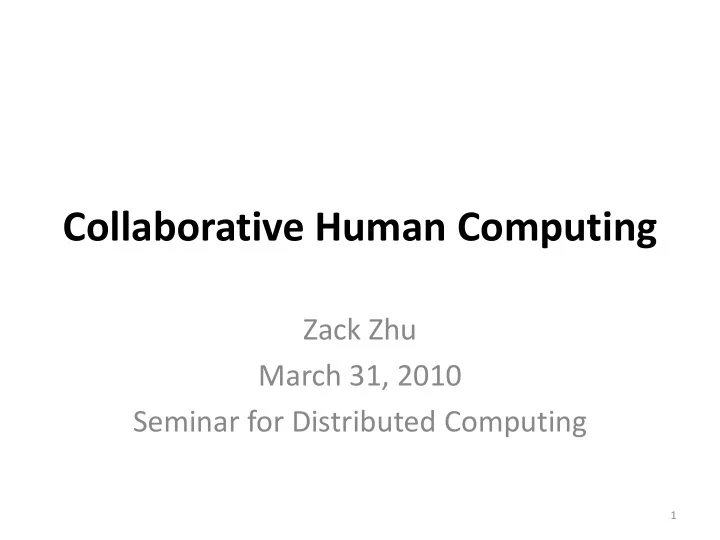

Collaborative Human Computing Zack Zhu March 31, 2010 Seminar for Distributed Computing 1
Distributed Computing... 2
...redefined: Distributed Thinking 3
“Crowdsourcing” + Human Resource = $$$$$!! Internet + Web 2.0 $ $ 4
Crowdsourcing • Search for Extraterrestrial Intelligence • Earliest project utilizing the idea (launched in May 1999) • Voluntary distributed computing 5
Distributed Thinking + Crowdsourcing Collaborative Human Computing 6
Collaborative Human Computing 7
• Crowdsourced R&D 10
• Why it works: – Solver Diversity – Workforce Mentality – Vetted Input 11
12
13
Mechanical Turk Human Intelligence Tasks (HIT) – Relatively trivial for users – Difficult to automate – Low payout: $0.01-$5/HIT For example: – Image tagging – Write a review (movies, CDs) Virtual Sweatshop???? – Rank a series of pictures 14
How about harnessing the power of masses for FREE and Get Paid? 15
16
6,969,696,969 votes / 85% 17
To see the next picture… Lesson : Give the crowd something they need... 18
• Initiative to digitize typeset text – Today: OCR fails to recognize 20% of scanned text • How? 1. Scanned page 2. Decipher with 2 independent OCR programs 3. List suspicious words (no consensus) 4. Distort and send out as reCaptcha 19
Control Word Unrecognized Word (known from previous reCaptchas) 6. Enter unrecognized word into database (consensus established between n people) 20
Is it secure? 1. Scanning Noise 2. Artificial Transformation • More secure than 3. Natural Fading conventional Captchas – Anti-captcha algorithms – 100% Successful in failing anti-captcha algorithms – Computer-generated Captcha 90% successful 21
Is it successful? – Accuracy of 99.1% • Human: 99% • Standard OCR: 83.5% – 440 Million words deciphered in the 1 st year (~17,600 books) – 35 Million words/day (March, 2009) 22
9 BILLION human-hours/year 23
gwap 24
gwap Image Tagging 25
• Is it fun? – 15 million agreements (tags) from 75,000 players – 200,000 regular players – Many people play >20 hours a week – Playing streaks of >15 hours 26
• Why? – Sense of connection with your partner • Bush • President • Man • Yuck “...the two of you are bringing your minds together in ways lovers would envy.” 27
Single Player Version? • Record moves of players with time stamps • Play pre-recorded moves • ESN Game – Moves recorded (Player A): (0:02) goddess; (0:03) ziyi (0:04) thoughtful; (0:08) hot Taboo Words Time Player 1 Bot (Player A) Woman 0:01 ziyi Beautiful 0:02 asian goddess Gorgeous 0:03 model ziyi 28
…0 Player? Moves recorded Bot 1: (0:02) goddess; (0:04) face; (0:08) hot (0:14) flowers Bot 2 : (0:01) flowers ; (0:02) model; (0:03) asian; (0:09) girl 29
Generalization • Game <-> algorithm: Input-Output • Symmetric/Parallel: n player completing the same task Player 1: “pear, orange, apple” Store: apple Consensus Player 2: “…apple…” (e.g. ESN Game) 30
31
Ear Tusk Trunk/Tusk/Ear User-Created Pings Trunk 32
Hints: 33
Generalization Asymmetric/Sequential: Player 1’s output fed to Player 2’s input Player 1’s Player 2’s “Object” Task Guess “Object” 34
Security Measures Pretty standard … • Player queue • IP Check (location proximity) 35
Security Measures More interesting… • Test image/behaviour matching • Aggregated consensus • reCaptcha the gwap games? 36
References • L. von Ahn, M. Blum (2006). Peekaboom: A game for locating objects in images. In ACM CHI. • L. von Ahn, B. Maurer, C. McMillen, D. Abraham, and M. Blum. “reCAPTCHA: Human-Based Character Recognition via Web Security Measures.” Science, September 2008. J. Howe. “The Rise of Crowd Surfing” , Wired , June 2006. • D. P. Anderson , J. Cobb , E. Korpela , M. Lebofsky , D. Werthimer, • “SETI@home: an experiment in public-resource computing,” Communications of the ACM, v.45 n.11, p.56-61, November 2002 . • gwap, http://www.gwap.com • Amazon Mechanical Turk, https://www.mturk.com/mturk/welcome • Google Tech Talk, http://www.cs.cmu.edu/~biglou/ 37
Discussion • Net productivity? • Declining popularity with time, repackagable? • …your input? 38
Recommend
More recommend